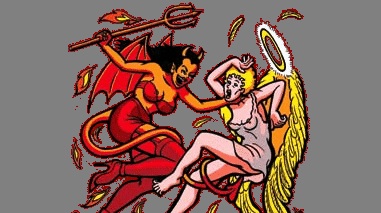On Fridays I will address a question related to depression and find the answer from an expert. If you have a question you want answered, please ask it on the combox of this post, and I’ll try my best to do some research and feature it in an upcoming Friday post.

I’ve been amazed by the mass of comments posted to my articles about emotional and physical affairs: “10 Steps to End an Affair,” “The Emotional Affair,” and “10 Red Flags of an Emotional Affair.” Because guilt can be a major ingredient to severe depression–and because so many Beyond Blue readers struggle with impure thoughts–I thought it would make for an appropriate Friday question. So I bring to you the wisdom of Dr. Christine B. Whelan, an Iowa-based social historian who is author of the book, “Why Smart Men Marry Smart Women” and writes the “Pure Sex, Pure Love” column for the young-adult spirituality website Busted Halo.
You can get to her excellent column “Impure Thoughts: What are they and where do they come from?” by clicking here. I have excerpted from it below.
Question: What do I do about my impure thoughts?
Dr. Christine Whelan:
The Bible tells us “For as he thinketh in his heart, so is he” (Proverbs 26:7) and the Buddha is quoted as saying “What we think, we become.” Our minds are powerful tools, so it’s fair to ask the question: what counts as an impure thought? Why are these thoughts wrong? And isn’t just thinking it better than doing it?
Indeed, this is a hot topic. A record number of respondents filled out our recent BustedHalo survey on impure thoughts–and young-adult Catholics aren’t always in agreement with the experts.
Impure or forbidden thoughts include sexual fantasies, violence against others or ourselves, cheating, divorce, rape, and other behaviors that we think of as the worst possible things we could do or have happen to us.
According to our poll, so-called impure thoughts are common: 70% of male respondents and 30% of female respondents said they have what they consider to be impure thoughts once a day or more. Some 43% of respondents said they had confessed their impure thoughts to a priest–and men were more likely to confess than women.
But if the thoughts pop into your mind and then leaves fairly quickly, it’s probably not a big deal. In fact, psychologists often say this is part of the way humans think about right and wrong and reinforce our own ideas of what we would and wouldn’t do.
“Impure feelings simply exist. They aren’t moral realities. It’s what we do with them that determines if they are sinful or not,” said Fr. Gerard J. McGlone, an assistant professor of clinical psychology at St. Joseph’s University. “A sin is a free, conscious act of the will. An impulsive reaction to a situation you didn’t choose isn’t a conscious act of the will. How can that be sinful?”
Other psychologists agree: “If we were somehow able to build a thought recorder, what we would record would be just about every kind of thought imaginable. Sexual thoughts, violent thoughts, some of them are very strange and bizarre-but for the most part, fleeting. They go in one ear and out the other, and a millisecond later you’ve forgotten about them,” argued psychologist David H. Barlow, director of the Center for Stress and Anxiety Disorders at the State University of New York-Albany, as quoted in an article published by “Psychology Today.”
It’s when you dwell on them that it becomes dangerous. Let’s say you are having a sexual fantasy, and you encourage it, you continue it, and you allow yourself to get lost in the fantasy world that you are creating in your head. That, said Fr. McGlone, is when it gets sinful.
If lustful or violent thoughts are a recurring problem, Fr. McGlone said as a psychologist he’s interested in getting at the reasons why before condemning the thoughts as sinful.
A man who feels lust for women he passes on the street, but no sexual emotion at all for his wife, has a problem that needs to be addressed. “Might those feelings be giving us information that we aren’t using? I’d be much more concerned about the thoughts behind those potentially impure thoughts,” he said.
But here’s a possible catch: If you are trying to banish a sexual fantasy from your head, telling yourself “I’m not going to fantasize about her” or “I won’t think about what it would be like to be intimate with him” might make it worse: In a famous psychological study from the 1980s, a group of subjects were told to think about anything but whatever they did, they were not supposed to think about a white bear. Guess what they all thought about?
And not all forbidden thoughts are sexual: A friend of mine said she sometimes thinks how easy it would be to jump in front of the oncoming train while she’s waiting on the subway platform during rush hour. Is that a sin?
No. And thoughts like that are incredibly common. “That’s a thought she has no control over. The thought that you could jump in front of a train isn’t necessarily suicidal. Are you exhausted and just have a thought about how easy it would be to lie in front of the train and rest? Are you hurt or hopeless? There are 10,000 possible feelings, but I’m concerned with the one that’s most important to you,” said Fr. McGlone.
The bottom line is that just having a fleeting sexual, violent, evil or other type of impure thought isn’t a sin. But allowing that thought to become a reality–even if it’s only in the fantasy world of your head–gets into dangerous territory.
All this being said, don’t beat yourself up. We all wrestle with weird, dark or forbidden thoughts of some kind-and most of them aren’t sinful.
Just don’t think about the white bear.
To read more Beyond Blue, go to www.beliefnet.com/beyondblue, and to get to Group Beyond Blue, a support group at Beliefnet Community, click here.

